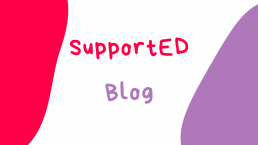Isolation Book
To mark EDAW we decided to create a book of peoples stories, art, poetry. We want people to be able to share their experiences in whatever way suits them best. This book is made up of work from people that use our services, our volunteers and others we work with. Each and every work comes from lived or living experience (sometimes both- where do we draw the line of what's lived and living). It is an absolute honour to be able to share these people's work to the world. To access the book, click the link below. If you would like a hard copy, please email Iona at community@supportedscotland.org but please note we have a limited supply.
Welcome to SupportED's blog!
Hello!
For a while at SupportED we have been keen to start a blog and we’ve finally taken the plunge! The SupportED blog will be a place for people to express their experiences, views and stories. Anyone can contribute to the blog, such as our staff, our volunteers and people that use our services. Blog posts may include fiction stories, non-fiction stories, poems, opinion pieces- the possibilities are endless. The general theme will likely be eating disorders but we will welcome any topic people find relevant.
Keep your eyes peeled for our first post!
If you have any ideas for a blog you would like to write, please contact Iona at community@supportedscotland.org.

